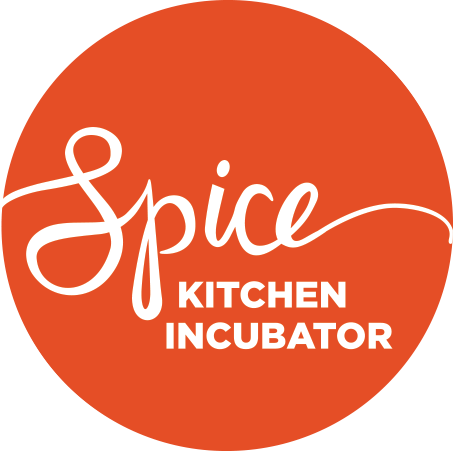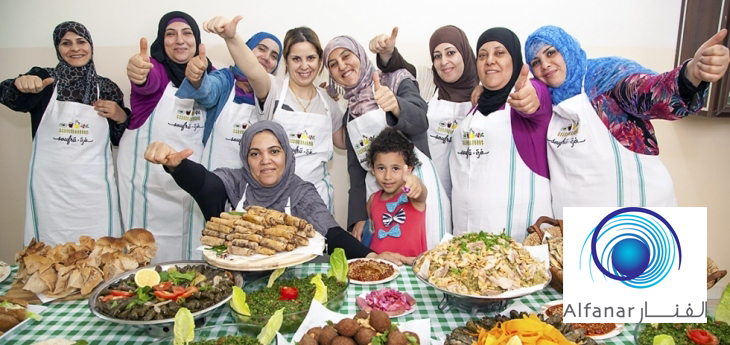Film Screening of "Soufra"
(Oct. 2018) - Thursday, Oct. 11 Spice Kitchen partnered with the Utah Film Center to screen Soufra - Film, an inspirational story about a group of refugee women working towards food business ownership.
A panel of female advocates gathered on stage at the end of the film to discuss their experiences working with refugees, starting a food business, giving back, and the making of the film! Panelists included: Natalie El-Deiry, The International Rescue Committee in Salt Lake City's acting Executive Director, Lavanya Mahate, Founder of Saffron Valley Restaurants and Catering, Ze Min Xiao (Zee), Director of the Salt Lake County Mayor’s Office for New Americans, and Ginger Tolman, a producer of the film.
Soufra follows the unlikely and wildly inspirational story of intrepid social entrepreneur, Mariam Shaar – a generational refugee who has spent her entire life in the Burj El Barajneh refugee camp just south of Beirut, Lebanon. The film follows Mariam as she sets out against all odds to change her fate by launching a successful catering company, “Soufra,” and then expand it into a food truck business with a diverse team of fellow refugee woman who now share this camp as their home.
Post-film panel discussion with Spice Kitchen Incubator organized by the International Rescue Committee in Salt Lake City.
When:
Thursday, October 11, 2018
7:00 PM
FREE
Where:
The City Library
210 East 400 South, Salt Lake City
Directed by Thomas A. Morgan
73 min | 2017 | USA/Lebanon | Not Rated
Presented in Arabic with English subtitles
Winner: Best Foreign Documentary - 2018 Cinetopia Film Festival; Audience Award Winner - 2018 Florida Film Festival; Cinema for Humanity Audience Prize - 2017 El Gouna Film Festival; Best Arabic Feature Documentary - 2017 El Gouna Film Festival; Official Selection Doc NYC 2017.
This screening is part of the Soufra 2018-2019 global screening tour. Presented in celebration of International Day of the Girl.
Film Synopsis | Alfranar & Soufra Catering | Soufra Cookbook
Soufra – Film
Film Synopsis
Soufra follows the unlikely and wildly inspirational story of intrepid social entrepreneur, Mariam Shaar – a generational refugee who has spent her entire life in the Burj El Barajneh refugee camp just south of Beirut, Lebanon. The film follows Mariam as she sets out against all odds to change her fate by launching a successful catering company, “Soufra,” and then expand it into a food truck business with a diverse team of fellow refugee woman who now share this camp as their home. Together, they heal the wounds of war through the unifying power of food while taking their future into their own hands through an unrelenting belief in Mariam, and in each other. In the process, Mariam is breaking barriers, pulling together Syrian, Iraqi, Palestinian and Lebanese women to work side by side and form beautiful friendships while running this thriving business.
Soufra will shine a new and revealing light on people inside of the largest refugee crisis in human history, but ultimately this film is about hope, grit, passion and the common bonds created by bringing people together around food as a bridge to overcome all barriers. Though Mariam is officially considered “stateless” she is a beacon of hope and home for thousands upon thousands of women in the most unlikely of places. Mariam and her team will be just that for thousands more once her story is told through Soufra.
Alfranar & Soufra Catering
Established in 2004, Alfanar is the first venture philanthropy organization working exclusively in the Arab region. Alfanar’s goal is to ensure that the poor and vulnerable, especially women and children, are able to access the education and opportunity they need to lead productive and dignified lives. They work to help social enterprises improve lives through financial stability, supporting grassroots organizations and helping them achieve lasting social change in their communities.
When Mariam Shaar approached Alfanar in 2014, she was already running the Women’s Program Association (WPA) in the Burj al Barajneh Palestinian refugee camp in Beirut, which provides education, vocational skills training and microloans to women in the camps.
As part of her work with the WPA, Mariam had recently carried out a survey of women in the camp to find out what they like doing, and how they thought they could generate an income and found that the majority said they wanted to improve their cooking skills. Mariam could see the opportunities to market delicious Palestinian food while also building women’s skills and confidence, so she asked Alfanar to help the WPA set up a catering unit to manifest her vision.
After an initial pilot year that combined business support with seed funding to help cover the costs of launching the new catering unit, in 2014 Alfanar renewed their commitment to WPA, providing a new injection of funds aimed at professionalising its efforts. The catering unit was rebranded Soufra (meaning 'dining table' in Arabic), and in just two years, Alfanar helped the business recover all its costs, improve its offering and gain an edge in the highly competitive Beirut catering market.
Soufra is far more than just a catering business. It has had a profound impact on the lives of the women involved in it. Before, many of them say they felt hopeless, rarely leaving the camp. Today, they feel confident and excited about the future, and are leaders in their community.
The Soufra Cookbook
This cookbook, and the affiliated documentary film also titled Soufra, by Rebelhouse Group, accompanies Mariam Shaar on her journey of empowerment by developing a thriving business that employs the incredible women of the Burj el-Barajneh refugee camp in Lebanon.
Mariam was born in the Burj el-Barajneh camp in the 1970s, almost three decades after her grandmother arrived as the Palestinian refugee crisis began. Like all refugees, her family was forbidden from holding most jobs, lacked documentation to leave the country legally, and did not have the financial means to move outside the camp. So they stayed. Mariam has spent her entire life in the camp, surviving the Lebanese Civil War and a series of other brutal conflicts, including the “war of the camps.”
Driven by a relentless desire to make life in the camp better, she dedicated herself to improving not only her own life but also the lives of those around her. In the 1990’s, she joined the Women’s Program Association, a community-based organization founded with the support of UNRWA to bring together women in the refugee camps in Lebanon to build new opportunities. Today she is the director of WPA’s community-based center in the Burj el-Barajneh camp.
Mariam’s vision has always been to create opportunities for the refugee community and improve lives through education and production. With the intention of creating a sustainable business at the WPA center in Burj el-Barajneh, she surveyed local women to get a sense of their interests. She discovered that many women were interested in utilizing their cooking skills, as they could participate in that at both the community center and in their own homes. Perhaps most important, it was something that reflected their heritage and passions, and something for which there would always be a market. Everyone needs to eat!
With seed funding and business planning support from Alfanar venture philanthropy, Soufra catering was born in 2013. Like any start-up, it went through many iterations. Different names, logos, and business plans were tested. Mariam partnered with Souk El Tayeb, a leading social enterprise in Lebanon, on training and branding. The idea was to revive traditional Palestinian dishes and offer them to the Beirut market. The dishes were met with huge acclaim. But despite the positive reviews, not enough catering orders were coming in. In a brainstorming session with the women of Soufra and its stakeholders, the idea of a food truck was hatched, and with it a whole new journey began!
In 2015, social justice filmmaker Thomas Morgan heard about Alfanar’s work with Soufra. He came to Lebanon to meet Mariam, and ended up dedicating two years of his life to filming her story and helping turn her vision into reality. With the help of a Kickstarter campaign, the Soufra women raised more than enough money to launch the first-ever refugee food truck. In so doing, they made it possible to take their food and their business to customers all over Lebanon, and began providing more and more jobs for women inside the camp.
Not only does this cookbook share some of the most treasured recipes that changed the lives of the Soufra women, but it also will give back to the families at the camp. The women of Soufra, through WPA, are full partners in the publication of this book. They will share equally in proceeds from its sales, which will contribute to the ongoing development of the camp’s Children’s Center and to building a school for the children in the camp.





